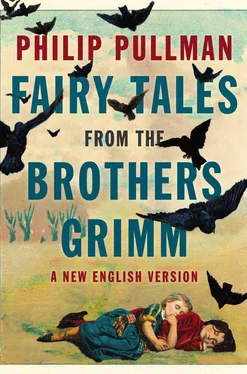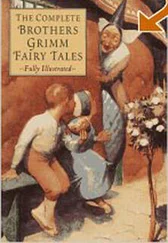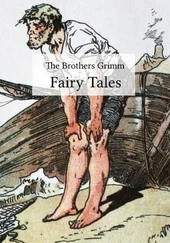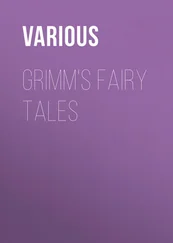He opened his knapsack and gave her the donkey cabbage. She took it eagerly and hurried to the kitchen, her mouth already watering. She put some water on to boil and chopped the cabbage up daintily, and boiled it for just a few minutes with some salt and a little butter. It smelt so good that she couldn’t resist, and before she brought it to the table she nibbled at one of the leaves, and then another, and of course as soon as she swallowed them she started to change. In a matter of seconds she was an old donkey, and she ran out into the courtyard to kick up her heels.
Next the serving girl came in, and smelling the buttery cabbage she couldn’t help having a bite herself. This was an old habit of hers, and sure enough, the same thing happened to her. She couldn’t hold the bowl with her new hooves, so she dropped it where it was and ran outside.
Meanwhile the witch’s daughter was sitting talking to the messenger.
‘I don’t know what’s keeping them,’ she said. ‘It does smell good.’
The hunter thought that the magic must have happened by this time.
‘Leave it to me,’ he said. ‘I’ll go and get it.’
When he got to the kitchen he saw the two donkeys running around the courtyard, and thought, ‘Good! Just as I planned it, and serve them right.’
He scooped up the cabbage that had fallen to the floor, put it in the bowl and brought it to the girl. She had some at once, and she too became a donkey and ran outside.
The hunter washed his face so that they could recognize him, and went out to the courtyard with a length of rope.
‘Yes,’ he said, ‘it was me. I’ve got you good and proper, and now you’re going to pay for your treachery.’
He tied all three to the rope, and drove them ahead of him out of the castle and along the road till then came to a mill. He knocked on the door.
‘What d’you want?’ said the miller.
‘I’ve got three ugly bad-tempered beasts here, and as they’re no good to me I want to get rid of them. If you take them and treat them as I tell you, I’ll pay whatever you ask.’
That wasn’t the sort of offer the miller got every day, so he agreed at once.
‘How d’you want me to treat them, then?’ he said.
‘Beat the old one three times a day, and feed her once’ (that was the witch). ‘The middle one can have three feeds a day and one beating’ (that was the servant), ‘and the young one’s not too bad. Feed her three times and don’t beat her at all.’ He couldn’t bring himself to have the girl beaten.
He went back to the castle and put his feet up. After a couple of days the miller came to see him.
‘That old donkey,’ he said, ‘she wasn’t much good. She’s dead now. But the other two are looking really down in the mouth. I don’t know what to do with them.’
‘Oh, all right,’ said the hunter. ‘I think they’ve probably been punished enough.’
He told the miller to drive the other two donkeys back to the castle, where he spread some of the round cabbage leaves on the ground and let them eat, so they became human beings again.
The witch’s beautiful daughter fell on her knees and said, ‘Oh, my dearest, forgive me for all the evil I did you! My mother forced me to do it. I never wanted to betray you, because I love you with all my heart. The wishing cloak is in the hall cupboard, and as for the bird’s heart, I’ll drink something to make me bring it up again.’
‘No need for that,’ he said, because he’d found himself in love with her all over again. ‘You can keep it. It won’t make any difference who has it, because I want to marry you.’
Their wedding was celebrated soon afterwards, and they lived together very happily until they died.
* * *
Tale type:ATU 567, ‘The Magic Bird-Heart’, continuing as ATU 566, ‘The Three Magic Objects and the Wonderful Fruits’
Source:a story from Bohemia, told to the Grimm brothers by an unknown informant
Similar stories:Alexander Afanasyev: ‘Horns’ ( Russian Fairy Tales ); Katharine M. Briggs: ‘Fortunatus’ ( Folk Tales of Britain ); Italo Calvino: ‘The Crab with the Golden Eggs’ ( Italian Folktales )
As quite often in Grimm, we have two separate story types sewn together here. Once the hunter has the bird’s heart and the wishing cloak, he could in theory go on to any kind of adventure. The story of the cabbage (sometimes translated as ‘lettuce’) which turns whoever eats it into a donkey has no logical connection with the first part of the story, but they fit together very well.
In Afanasyev’s Russian version of the story, the food (two kinds of apple, in this case) causes horns to grow on or to vanish from the eater’s head. Less inconvenient than turning into a donkey, no doubt, but still not easy to explain.
What I especially like about this tale is the young hunter’s cheerful good nature. It’s remarkable how few details of behaviour we need to evoke a personality.
FORTY-TWO
ONE EYE, TWO EYES AND THREE EYES
There was once a woman who had three daughters. She called the eldest One Eye, because she had one eye in the middle of her forehead. The second was called Two Eyes, because she had two eyes just like other people, and the youngest Three Eyes, because she had three eyes, the third one in the middle of her forehead like her eldest sister’s.
Because Two Eyes looked no different from everyone else, however, her mother and her sisters couldn’t stop criticizing her.
‘You two-eyed monster,’ they said, ‘who d’you think you are? There’s nothing special about you, my girl. You don’t belong with us.’
They gave her the shabbiest clothes to wear and nothing but leftover scraps from the table to eat. Between them, they made her life a misery.
One day Two Eyes had to go out and look after the goat. She was hungry, as usual, because there had been nothing but the dirty saucepan they’d cooked the porridge in to lick out for breakfast, and it was burnt, what’s more. She sat down on the grassy slope and began to cry. When the first sobbing had died away, she was surprised to see a kindly-looking wise woman standing nearby.
‘Why are you crying, Two Eyes?’ she said.
‘Because I’ve got two eyes like other people,’ replied Two Eyes. ‘Like you, for instance. My mother and my sisters hate me, and they push me around and give me nothing but worn-out old clothes to wear and make me eat the scraps they leave on the table. Today I only had the porridge saucepan to lick out, and it was burnt, too.’
‘Well, Two Eyes, you can stop crying now,’ said the wise woman. ‘I’ll tell you a secret, and you won’t be hungry any more. Just say to the goat:
“Little goat, bleat,
Bring me good things to eat,”
and a beautiful table with all sorts of good food will appear in front of you, and you can eat as much as you like. When you’ve had enough, just say:
“Little goat, bleat,
I’ve had all I can eat,”
and it’ll disappear.’
No sooner had she said that than the wise woman herself disappeared. Two Eyes thought she’d better try it straight away before she forgot it, and besides, she was too hungry to wait.
So she said:
‘Little goat, bleat,
Bring me good things to eat,’
and as soon as she’d said the words, there in front of her stood a table covered in a snowy white cloth. There was a plate with a silver knife and fork and spoon, and a snowy linen napkin as well, and of course a chair to sit on; but the food! There were hot dishes and cold dishes, casseroles and roast meat, vegetables of all kinds, and a great big apple pie, all freshly cooked and steaming hot.
Читать дальше












